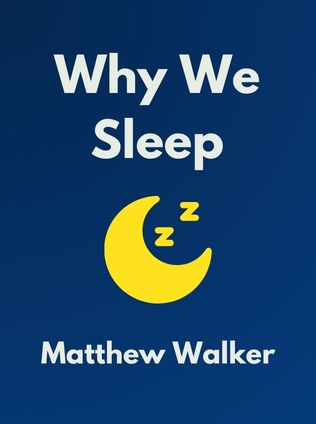
Why We Sleep
Unlocking the Power of Sleep and Dreams
By Matthew Walker
Published 09/2017
About the Author
"Why We Sleep" is authored by Dr. Matthew Walker, a neuroscientist and sleep expert who has dedicated his career to unraveling the mysteries of sleep. As a professor of neuroscience and psychology at the University of California, Berkeley, Walker is also the founder of the Center for Human Sleep Science. His research has significantly advanced the understanding of how sleep impacts various aspects of human health, including cognitive function, emotional stability, and longevity. Walker's work is widely recognized in the scientific community, and his contributions have been pivotal in shifting public perceptions about the importance of sleep. In "Why We Sleep," Walker aims to provide a thorough exploration of sleep's role in human health, backed by decades of scientific research, making the case that sleep is a fundamental pillar of well-being that is often overlooked in modern society.
Main Idea
"Why We Sleep" by Matthew Walker explores the vital role of sleep in human health and functioning. Walker argues that sleep is not merely a passive state but an active process crucial for maintaining mental, physical, and emotional well-being. The book examines the mechanisms of sleep, its benefits, and the devastating effects of sleep deprivation. Walker's primary thesis is that sleep is the single most effective thing we can do to reset our health and improve our cognitive and emotional resilience. He advocates for a greater societal emphasis on sleep and provides practical strategies for individuals to enhance their sleep quality.
"Sleep is the single most effective thing we can do to reset our brain and body health each day." - Matthew Walker
Table of Contents
- How Sleep Works
- Sleep Rhythm: Circadian Rhythm and Adenosine
- The Human Sleep Cycle: REM and NREM
- Sleep Across the Lifespan
- The Importance of Sleep
- Sleep and Brain Function
- The Physical Benefits of Sleep
- Consequences of Sleep Deprivation
- The Science of Dreams
- The Role of REM Sleep in Dreaming
- Emotional and Creative Benefits of Dreaming
- Improving Sleep
- Common Sleep Disruptors
- Practical Tips for Better Sleep
- Societal Changes to Promote Sleep
How Sleep Works
Walker begins by explaining the mechanisms that regulate sleep and the human sleep cycle. He introduces two primary systems: the circadian rhythm and adenosine. The circadian rhythm, often referred to as our internal body clock, is influenced by the cycle of light and darkness. It dictates our natural wake-sleep cycle, making us feel alert during the day and sleepy at night. This rhythm is regulated by melatonin, a hormone produced by the brain in response to darkness.
In tandem with the circadian rhythm is adenosine, a chemical that builds up in our brain while we are awake and creates "sleep pressure"—the urge to sleep. Throughout the day, adenosine levels increase, and once they reach a certain threshold, they signal the need for sleep. During sleep, adenosine levels decrease, which is why we feel refreshed and alert upon waking.
Sign up for FREE and get access to 1,400+ books summaries.
You May Also Like
The Subtle Art of Not Giving a F*ck
A Counterintuitive Approach to Living a Good Life
By Mark MansonHow To Win Friends and Influence People
The All-Time Classic Manual Of People Skills
By Dale CarnegieFreakonomics
A Rogue Economist Explores the Hidden Side of Everything
By Steven D. Levitt and Stephen J. DubnerQuiet: The Power of Introverts
The Power of Introverts in a World That Can't Stop Talking
By Susan Cain



















